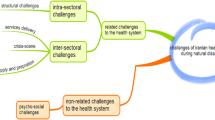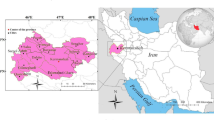Abstract
It is widely accepted that earthquake poses many challenges to human life. Therefore, the main objective of this study was to explore challenges and problems facing the 2017 Kermanshah earthquake survivors. The present qualitative study was conducted using conventional qualitative content analysis in Kermanshah Province, Iran, in 2018. The data were collected through semi-structured interviews with 28 earthquake-stricken individuals, aged over 18 years, selected through purposive sampling method. The Graneheim and Lundman method was also used to analyze the data, and then Lincoln and Guba criteria were employed to provide robustness and transferability of the research. The results of data analysis were classified into 4 main categories and 11 sub-categories. Accordingly, the main categories were: (1) health problems and issues, (2) economic problems and issues, (3) improper management of human and non-human resources, and (4) incomplete social services. According to the results, earthquake victims face many challenges. Therefore, fundamental steps can be taken to reduce survivors’ problems by considering all aspects of their health, improving equal distribution of social assistance and services provided, and using local social capital in a better way.
Similar content being viewed by others
References
Ahmadi, S., Khankeh, H., Sahaf, R., Dalvandi, A., Hosseini, S. A., & Alipour, F. (2018). How did older adults respond to challenges after an earthquake? Results from a qualitative study in Iran. Archives of Gerontology and Geriatrics, 77, 189–195.
Alipour, F., Khankeh, H., Fekrazad, H., Kamali, M., Rafiey, H., & Ahmadi, S. (2015). Social issues and post-disaster recovery: A qualitative study in an Iranian context. International Social Work, 58(5), 689–703.
Alipour, F., Khankeh, H. R., Fekrazad, H., Kamali, M., Rafiey, H., Foroushani, P. S., …. Ahmadi, S. (2014). Challenges for resuming normal life after earthquake: A qualitative study on rural areas of iran. PLoS Currents, 6.
Anwar, J., Mpofu, E., Matthews, L. R., Shadoul, A. F., & Brock, K. E. (2011). Reproductive health and access to healthcare facilities: Risk factors for depression and anxiety in women with an earthquake experience. BMC Public Health, 11(1), 523–529.
Baral, I. A., & Bhagawati, K. (2019). Post traumatic stress disorder and coping strategies among adult survivors of earthquake, Nepal. BMC Psychiatry, 19(1), 118–125.
Baytiyeh, H., & Naja, M. (2016). The effects of fatalism and denial on earthquake preparedness levels. Disaster Prevention and Management, 25(2), 154–167.
Blanc, J., Bui, E., Mouchenik, Y., Derivois, D., & Birmes, P. (2015). Prevalence of post-traumatic stress disorder and depression in two groups of children one year after the January 2010 earthquake in Haiti. Journal of Affective Disorders, 172, 121–126.
Carter, F. A., Bell, C. J., Ali, A. N., McKenzie, J., & Wilkinson, T. J. (2014). The impact of major earthquakes on the psychological functioning of medical students: A Christchurch, New Zealand study. The New Zealand Medical Journal (Online), 127(1398), 54.
Dhar, S. A., Halwai, M. A., Mir, M. R., Wani, Z. A., Butt, M., Bhat, M. I., et al. (2007). The Kashmir earthquake experience. European Journal of Trauma and Emergency Surgery, 33(1), 74–80.
Duncan, E., Dorahy, M. J., Hanna, D., Bagshaw, S., & Blampied, N. (2013). Psychological responses after a major, fatal earthquake: The effect of peritraumatic dissociation and posttraumatic stress symptoms on anxiety and depression. Journal of Trauma & Dissociation, 14(5), 501–518.
Factor, S. H., Wu, Y., Monserrate, J., Edwards, V., Cuevas, Y., Del Vecchio, S., et al. (2002). Drug use frequency among street-recruited heroin and cocaine users in Harlem and the Bronx before and after September 11, 2001. Journal of Urban Health, 79(3), 404–408.
Farooqui, M., Quadri, S. A., Suriya, S. S., Khan, M. A., Ovais, M., Sohail, Z., … Hassan, M. (2017). Posttraumatic stress disorder: a serious post-earthquake complication. Trends in Psychiatry and Psychotherapy, 39(2), 135–143
Forouzan, A., Eftekhari, M. B., Falahat, K., Dejman, M., Heidari, N., & Habibi, E. (2013). Psychosocial needs assessment among Earthquake survivors in Lorestan province with an emphasis on the vulnerable groups. Global Journal of Health Science, 5(4), 79–86.
Fereydoun, V., Amir, S., & Ayub, S. (2012). Sociological analysis of Bam earthquake. Iranian Sociological Studies, 2(7), 9–23.
Gerdin, M., Clarke, M., Allen, C., Kayabu, B., Summerskill, W., Devane, D., et al. (2014). Optimal evidence in difficult settings: improving health interventions and decision making in disasters. PLoS Medicine, 11(4), e1001632.
Ghanjal, A., Bahadori, M., & Ravangard, R. (2019). An overview of the health services provision in the 2017 Kermanshah earthquake. Disaster Medicine and Public Health Preparedness, 13, 1–4.
Ghomian, Z., Khodadadizadeh, A., Jahangiri, K., & Yousef Nezhad, S. (2018). Bam, Iran, earthquake experiences, life suddenly collapse in a few seconds: A qualitative study. Journal of Qualitative Research in Health Sciences, 6(4), 414–426.
Glass, K., Flory, K., Hankin, B. L., Kloos, B., & Turecki, G. (2009). Are coping strategies, social support, and hope associated with psychological distress among Hurricane Katrina survivors? Journal of Social and Clinical Psychology, 28(6), 779–795.
Goenjian, A. K., Khachadourian, V., Armenian, H., Demirchyan, A., & Steinberg, A. M. (2018). Posttraumatic stress disorder 23 years after the 1988 Spitak Earthquake in Armenia. Journal of Traumatic Stress, 31(1), 47–56.
Graneheim, U. H., & Lundman, B. (2004). Qualitative content analysis in nursing research: Concepts, procedures and measures to achieve trustworthiness. Nurse Education Today, 24(2), 105–112.
Guha-Sapir, D., Vos, F., Below, R., & Ponserre, S. (2012). Annual disaster statistical review 2011: the numbers and trends. https://emdat.be/sites/default/files/adsr_2016.pdf.
Henderson, T. L., Roberto, K. A., & Kamo, Y. (2010). Older adults’ responses to Hurricane Katrina: Daily hassles and coping strategies. Journal of Applied Gerontology, 29(1), 48–69.
Hyodo, K., Nakamura, K., Oyama, M., Yamazaki, O., Nakagawa, I., Ishigami, K., et al. (2010). Long-term suicide mortality rates decrease in men and increase in women after the Niigata-Chuetsu earthquake in Japan. The Tohoku Journal of Experimental Medicine, 220(2), 149–155.
Khankeh, H. R., Khorasani-Zavareh, D., Johanson, E., Mohammadi, R., Ahmadi, F., & Mohammadi, R. (2011). Disaster health-related challenges and requirements: A grounded theory study in Iran. Prehospital and Disaster Medicine, 26(3), 151–158.
Kuwabara, H., Shioiri, T., Toyabe, S. I., Kawamura, T., Koizumi, M., Ito-Sawamura, M., et al. (2008). Factors impacting on psychological distress and recovery after the 2004 Niigata-Chuetsu earthquake, Japan: Community-based study. Psychiatry and Clinical Neurosciences, 62(5), 503–507.
Liang, Y., & Cao, R. (2014). Is the health status of female victims poorer than males in the post-disaster reconstruction in China: A comparative study of data on male victims in the first survey and double tracking survey data. BMC Women's Health, 14(1), 18–24.
Lebni, J. Y., Khorami, F., Azar, F. E. F., Khosravi, B., Safari, H., & Ziapour, A. (2020). Experiences of rural women with damages resulting from an earthquake in Iran: A qualitative study. BMC Public Health, 20(1), 1–13.
Lincoln, Y. S., Lynham, S. A., & Guba, E. G. (2011). Paradigmatic controversies, contradictions, and emerging confluences, revisited. The Sage Handbook of Qualitative Research, 4, 97–128.
Ni, C., Chow, M. C. M., Jiang, X., Li, S., & Pang, S. M. C. (2015). Factors associated with resilience of adult survivors five years after the 2008 Sichuan earthquake in China. PLoS ONE, 10(3), e0121033.
Nobakht, H. N., Ojagh, F. S., & Dale, K. Y. (2019). Risk factors of post-traumatic stress among survivors of the 2017 Iran earthquake: The importance of peritraumatic dissociation. Psychiatry Research, 271, 702–707.
Rafiey, H., Alipour, F., LeBeau, R., & Salimi, Y. (2019). Prevalence and determinants of PTSD 3 years after an earthquake in Iran. Community Mental Health Journal, 55(3), 542–547.
Rakhshani, T., Taravatmanesh, S., Khorramdel, K., & Ebrahimi, M. (2017). Social support for earthquake victims in East Azerbaijan, Iran. Archives of Psychiatry and Psychotherapy, 4, 66–72.
Rathore, F. A., Farooq, F., Muzammil, S., New, P. W., Ahmad, N., & Haig, A. J. (2008). Spinal cord injury management and rehabilitation: Highlights and shortcomings from the 2005 earthquake in Pakistan. Archives of Physical Medicine and Rehabilitation, 89(3), 579–585.
Ruwanpura, K. N. (2008). Temporality of disasters: The politics of women's livelihoods ‘after’ the 2004 tsunami in Sri Lanka. Singapore Journal of Tropical Geography, 29(3), 325–340.
Şalcıoğlu, E., & Başoğlu, M. (2008). Psychological effects of earthquakes in children: Prospects for brief behavioral treatment. World Journal of Pediatrics, 4(3), 165–172.
Schwind, J. S., Norman, S. A., Brown, R., Frances, R. H., Koss, E., Karmacharya, D., et al. (2019). Association between earthquake exposures and mental health outcomes in Phulpingdanda Village after the 2015 Nepal earthquakes. Community Mental Health Journal, 55, 1–11.
Taylor, A. J., & Patten, M. D. (1989). Reactions of the elderly in New Zealand to nuclear war and other nuclear issues. Journal of Applied Gerontology, 8(4), 492–501.
Tsai, K., Chou, F., & Ou-Yang, W. (2004). Association of psychiatric diseases and quality of life among earthquake survivors in Taiwan. Taiwanese Journal of Psychiatry, 18, 96–107.
Tural, Ü., Coşkun, B., Önder, E., Çorapçioǧlu, A., Yildiz, M., Kesepara, C., et al. (2004). Psychological consequences of the 1999 earthquake in Turkey. Journal of Traumatic Stress: Official Publication of The International Society for Traumatic Stress Studies, 17(6), 451–459.
Van Griensven, F., Chakkraband, M. S., Thienkrua, W., Pengjuntr, W., Cardozo, B. L., Tantipiwatanaskul, P., et al. (2006). Mental health problems among adults in tsunami-affected areas in southern Thailand. JAMA, 296(5), 537–548.
Vlahov, D., Galea, S., Resnick, H., Ahern, J., Boscarino, J. A., Bucuvalas, M., et al. (2002). Increased use of cigarettes, alcohol, and marijuana among Manhattan, New York, residents after the September 11th terrorist attacks. American Journal of Epidemiology, 155(11), 988–996.
Wu, Z., Xu, J., & He, L. (2014). Psychological consequences and associated risk factors among adult survivors of the 2008 Wenchuan earthquake. BMC Psychiatry, 14(1), 126–131.
Wu, Z., Xu, J., & Sui, Y. (2016). Posttraumatic stress disorder and posttraumatic growth coexistence and the risk factors in Wenchuan earthquake survivors. Psychiatry Research, 237, 49–54.
Xiao, Y., Liu, D., Liu, K., & Jiang, X. (2019). Post-traumatic stress disorder and its risk factors in bereaved Tibetan adolescents 3 years after the 2010 Yushu earthquake, a cross-sectional study in China. Archives of Psychiatric Nursing, 33(2), 149–154.
Xu, J., Wang, Y., & Tang, W. (2019). Risk factors of post-traumatic stress and depressive disorders in longmenshan adolescents after the 2013 Lushan earthquake. Community Mental Health Journal, 55(3), 497–506.
Yagi, J., Fujiwara, T., Yambe, T., Okuyama, M., Kawachi, I., & Sakai, A. (2016). Does social capital reduce child behavior problems? Results from the Great East Japan earthquake follow-up for children study. Social Psychiatry and Psychiatric Epidemiology, 51(8), 1117–1123.
Yang, C. H., Xirasagar, S., Chung, H. C., Huang, Y. T., & Lin, H. C. (2005). Suicide trends following the Taiwan earthquake of 1999: Empirical evidence and policy implications. Acta Psychiatrica Scandinavica, 112(6), 442–448.
Yip, P. (2009). Effects of an earthquake on suicide rates in Nantou, Taiwan. The British Journal of Psychiatry, 194(2), 190–190.
Acknowledgements
The authors would like to thank all the participants who patiently participated.
Author information
Authors and Affiliations
Corresponding author
Ethics declarations
Conflict of interest
The authors declare that they have no conflict of interest.
Ethical Approval
Ethical approval was obtained from the Ethical Review Committee of (IR.KUMS.REC.1398.394). Written informed consent was obtained from all participants.
Additional information
Publisher's Note
Springer Nature remains neutral with regard to jurisdictional claims in published maps and institutional affiliations.
Rights and permissions
About this article
Cite this article
Khosravi, B., Xosravi, T., Ziapour, A. et al. Challenges and Problems Facing 2017 Kermanshah Earthquake Survivors: A Qualitative Study. Community Ment Health J 57, 340–348 (2021). https://doi.org/10.1007/s10597-020-00652-1
Received:
Accepted:
Published:
Issue Date:
DOI: https://doi.org/10.1007/s10597-020-00652-1




